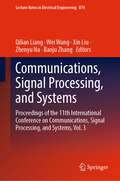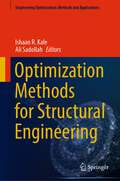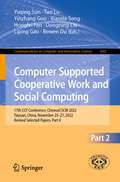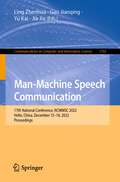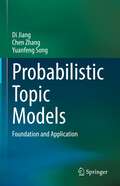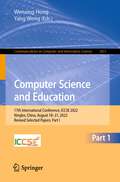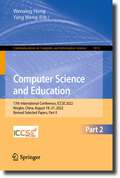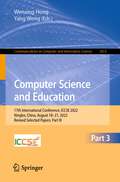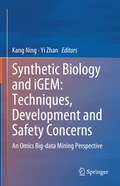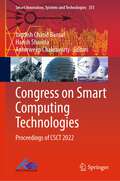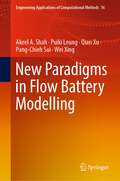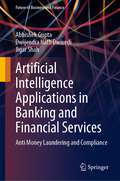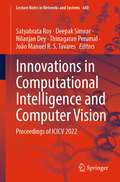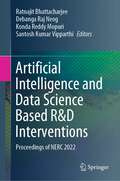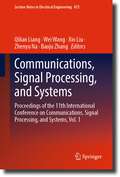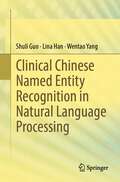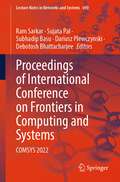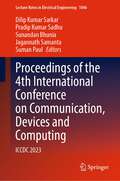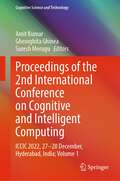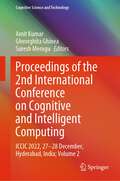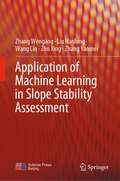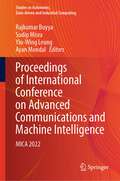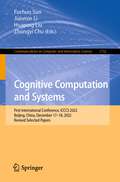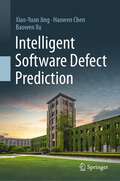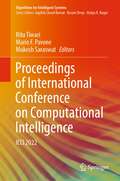- Table View
- List View
Communications, Signal Processing, and Systems: Proceedings of the 11th International Conference on Communications, Signal Processing, and Systems, Vol. 3 (Lecture Notes in Electrical Engineering #874)
by Qilian Liang Wei Wang Xin Liu Zhenyu Na Baoju ZhangThis book brings together papers presented at the 2022 International Conference on Communications, Signal Processing, and Systems, online, July 23-24, 2022, which provides a venue to disseminate the latest developments and to discuss the interactions and links between these multidisciplinary fields. Spanning topics ranging from communications, signal processing and systems, this book is aimed at undergraduate and graduate students in Electrical Engineering, Computer Science and Mathematics, researchers and engineers from academia and industry as well as government employees (such as NSF, DOD and DOE).
Optimization Methods for Structural Engineering (Engineering Optimization: Methods and Applications)
by Ishaan R. Kale Ali SadollahThis contributed book focuses on optimization methods inspired by nature such as Harmony Search Algorithm, Drosophila Food-Search Algorithm, Cohort intelligence algorithm and its variations, fuzzy logic along with their hybridization variants. It also focuses on multi-objective optimization algorithms such as Non-Dominated Sorting Genetic Algorithm, Particle Swarm Optimization, Evolutionary Algorithm, Pareto Envelope Selection Algorithm, and Strength Pareto Evolutionary Algorithm. The content focuses on topics such as the optimal design of truss systems with various applications, the design and simulation of quarter car systems for comfort design, the road handling design and a balanced system, and topology optimization of 2-dimensional and 3-dimensional structure in linear elasticity, plasticity and fracture mechanics among others. This book is a useful reference for those in academia and industry.
Computer Supported Cooperative Work and Social Computing: 17th CCF Conference, ChineseCSCW 2022, Taiyuan, China, November 25–27, 2022, Revised Selected Papers, Part II (Communications in Computer and Information Science #1682)
by Yuqing Sun Tun Lu Yinzhang Guo Xiaoxia Song Hongfei Fan Dongning Liu Liping Gao Bowen DuThis two-volume set constitutes the refereed proceedings of the 17th CCF Conference on Computer Supported Cooperative Work and Social Computing, ChineseCSCW 2022 held in Datong, China, during September 23–25, 2022.The 60 full papers and 30 short papers included in this two-volume set were carefully reviewed and selected from 211 submissions. They were organized in topical sections as follows: answer set programming; Social Media and Online Communities, Collaborative Mechanisms, Models, Approaches, Algorithms and Systems; Crowd Intelligence and Crowd Cooperative Computing; Cooperative Evolutionary Computation and Human-like Intelligent Collaboration; Domain-Specific Collaborative Applications.
Man-Machine Speech Communication: 17th National Conference, NCMMSC 2022, Hefei, China, December 15–18, 2022, Proceedings (Communications in Computer and Information Science #1765)
by Ling Zhenhua Gao Jianqing Yu Kai Jia JiaThis book constitutes the refereed proceedings of the 17th National Conference on Man–Machine Speech Communication, NCMMSC 2022, held in China, in December 2022.The 21 full papers and 7 short papers included in this book were carefully reviewed and selected from 108 submissions. They were organized in topical sections as follows: MCPN: A Multiple Cross-Perception Network for Real-Time Emotion Recognition in Conversation.- Baby Cry Recognition Based on Acoustic Segment Model, MnTTS2 An Open-Source Multi-Speaker Mongolian Text-to-Speech Synthesis Dataset.
Probabilistic Topic Models: Foundation and Application
by Di Jiang Chen Zhang Yuanfeng SongThis book introduces readers to the theoretical foundation and application of topic models. It provides readers with efficient means to learn about the technical principles underlying topic models. More concretely, it covers topics such as fundamental concepts, topic model structures, approximate inference algorithms, and a range of methods used to create high-quality topic models. In addition, this book illustrates the applications of topic models applied in real-world scenarios. Readers will be instructed on the means to select and apply suitable models for specific real-world tasks, providing this book with greater use for the industry. Finally, the book presents a catalog of the most important topic models from the literature over the past decades, which can be referenced and indexed by researchers and engineers in related fields. We hope this book can bridge the gap between academic research and industrial application and help topic models play an increasingly effective role in both academia and industry. This book offers a valuable reference guide for senior undergraduate students, graduate students, and researchers, covering the latest advances in topic models, and for industrial practitioners, sharing state-of-the-art solutions for topic-related applications. The book can also serve as a reference for job seekers preparing for interviews.
Computer Science and Education: 17th International Conference, ICCSE 2022, Ningbo, China, August 18–21, 2022, Revised Selected Papers, Part I (Communications in Computer and Information Science #1811)
by Wenxing Hong Yang WengThis three-volume set constitues selected papers presented during the 17th International Conference on Computer Science and Education, ICCSE 2022, held in Ningbo, China, in August 2022.The 168 full papers and 43 short papers presented were thoroughly reviewed and selected from the 510 submissions. They focus on a wide range of computer science topics, especially AI, data science, and engineering, and technology-based education, by addressing frontier technical and business issues essential to the applications of data science in both higher education and advancing e-Society.
Computer Science and Education: 17th International Conference, ICCSE 2022, Ningbo, China, August 18–21, 2022, Revised Selected Papers, Part II (Communications in Computer and Information Science #1812)
by Wenxing Hong Yang WengThis three-volume set constitues selected papers presented during the 17th International Conference on Computer Science and Education, ICCSE 2022, held in Ningbo, China, in August 2022.The 168 full papers and 43 short papers presented were thoroughly reviewed and selected from the 510 submissions. They focus on a wide range of computer science topics, especially AI, data science, and engineering, and technology-based education, by addressing frontier technical and business issues essential to the applications of data science in both higher education and advancing e-Society.
Computer Science and Education: 17th International Conference, ICCSE 2022, Ningbo, China, August 18–21, 2022, Revised Selected Papers, Part III (Communications in Computer and Information Science #1813)
by Wenxing Hong Yang WengThis three-volume set constitues selected papers presented during the 17th International Conference on Computer Science and Education, ICCSE 2022, held in Ningbo, China, in August 2022.The 168 full papers and 43 short papers presented were thoroughly reviewed and selected from the 510 submissions. They focus on a wide range of computer science topics, especially AI, data science, and engineering, and technology-based education, by addressing frontier technical and business issues essential to the applications of data science in both higher education and advancing e-Society.
Synthetic Biology and iGEM: An Omics Big-data Mining Perspective
by Kang Ning Yi ZhanThis book focuses on biological engineering techniques, multi-omics big-data integration, and data-mining techniques, as well as cutting-edge researches in principles and applications of several synthetic biology applications. Synthetic biology is a new research area, while it has been rooted from the long-established area including biological engineering, metabolite engineering, and systems biology. This book will discuss the following aspects: (1) introduction to synthetic biology and iGEM, especially focusing on the systematic design, rational engineering, and sustainability of design in the omics ages; (2) synthetic biology–related multi-omics data integration and data mining techniques; (3) the technical issues, development issues, and safety issues of synthetic biology; (4) data resources, web services, and visualizations for synthetic biology; and (5) advancement in concrete research on synthetic biology, with several case studies shown. Devised as a book on synthetic biology research and education in the omics age, this book has put focuses on systematic design, rational engineering, and sustainability of design for synthetic biology, which will explain in detail and with supportive examples the “What,” “Why,” and “How” of the topic. It is an attempt to bridge the gap between synthetic biology’s research and education side, for best practice of synthetic biology and in-depth insights for the related questions.
Congress on Smart Computing Technologies: Proceedings of CSCT 2022 (Smart Innovation, Systems and Technologies #351)
by Jagdish Chand Bansal Harish Sharma Antorweep ChakravortyThis book presents high-quality research papers presented at Congress on Smart Computing Technologies (CSCT 2022) organized by SAU Center for Research and Innovative Learning (SCRIL), South Asian University, India, from 3–4 December 2022. The book extensively covers recent research in algorithms for smart computing, AI and machine learning in smart computing, edge computing algorithms, adversarial networks and autoencoders, data visualization, data mining, data analytics, machine learning, game theory, high-performance computing, mobile and ubiquitous platforms for smart environments, cloud/edge/fog computing technologies for smart systems, Internet of Things (IoT) and industrial IoT technologies for smart systems, smart device and hardware, security, privacy, and economics in smart environments, big data, healthcare informatics, smart precision agriculture, smart transportation, social network analysis, and human–computer interaction.
New Paradigms in Flow Battery Modelling (Engineering Applications of Computational Methods #16)
by Akeel A. Shah Puiki Leung Qian Xu Pang-Chieh Sui Wei XingThis book provides a comprehensive review of the latest modelling developments in flow batteries, as well as some new results and insights. Flow batteries have long been considered the most flexible answer to grid scale energy storage, and modelling is a key component in their development. Recent modelling has moved beyond macroscopic methods, towards mesoscopic and smaller scales to select materials and design components. This is important for both fundamental understanding and the design of new electrode, catalyst and electrolyte materials. There has also been a recent explosion in interest in machine learning for electrochemical energy technologies. The scope of the book includes these latest developments and is focused on advanced techniques, rather than traditional modelling paradigms. The aim of this book is to introduce these concepts and methods to flow battery researcher, but the book would have a much broader appeal since these methods also employed in other battery and fuel cell systems and far beyond. The methods will be described in detail (necessary fundamental material in Appendices). The book appeals to graduate students and researchers in academia/industry working in electrochemical systems, or those working in computational chemistry/machine learning wishing to seek new application areas.
Artificial Intelligence Applications in Banking and Financial Services: Anti Money Laundering and Compliance (Future of Business and Finance)
by Abhishek Gupta Dwijendra Nath Dwivedi Jigar ShahThis book discusses all aspects of money laundering, starting from traditional approach to financial crimes to artificial intelligence-enabled solutions. It also discusses the regulators approach to curb financial crimes and how syndication among financial institutions can create a robust ecosystem for monitoring and managing financial crimes. It opens with an introduction to financial crimes for a financial institution, the context of financial crimes, and its various participants. Various types of money laundering, terrorist financing, and dealing with watch list entities are also part of the discussion. Through its twelve chapters, the book provides an overview of ways in which financial institutions deal with financial crimes; various IT solutions for monitoring and managing financial crimes; data organization and governance in the financial crimes context; machine learning and artificial intelligence (AI) in financial crimes; customer-level transaction monitoring system; machine learning-driven alert optimization; AML investigation; bias and ethical pitfalls in machine learning; and enterprise-level AI-driven Financial Crime Investigation (FCI) unit. There is also an Appendix which contains a detailed review of various data sciences approaches that are popular among practitioners.The book discusses each topic through real-life experiences. It also leverages the experience of Chief Compliance Officers of some large organizations to showcase real challenges that heads of large organizations face while dealing with this sensitive topic. It thus delivers a hands-on guide for setting up, managing, and transforming into a best-in-class financial crimes management unit. It is thus an invaluable resource for researchers, students, corporates, and industry watchers alike.
Innovations in Computational Intelligence and Computer Vision: Proceedings of ICICV 2022 (Lecture Notes in Networks and Systems #680)
by Satyabrata Roy Deepak Sinwar Nilanjan Dey Thinagaran Perumal João Manuel R. S. TavaresThis book presents high-quality, peer-reviewed papers from the International Conference on “Innovations in Computational Intelligence and Computer Vision (ICICV 2022),” hosted by Manipal University Jaipur, Rajasthan, India, on 24–25 November 2022. The book includes a collection of innovative ideas from researchers, scientists, academics, industry professionals and students. The book covers a variety of topics, such as artificial intelligence and computer vision, image processing and video analysis, applications and services of artificial intelligence and computer vision, interdisciplinary areas combining artificial intelligence and computer vision, and other innovative practices.
Artificial Intelligence and Data Science Based R&D Interventions: Proceedings of NERC 2022
by Ratnajit Bhattacharjee Debanga Raj Neog Konda Reddy Mopuri Santosh Kumar VipparthiThis book title is a composition of multiple research efforts that are based on cutting-edge Artificial Intelligence (AI) techniques. Some of the signal processing problems are addressed with techniques from the broad areas of machine learning and deep learning.
Communications, Signal Processing, and Systems: Proceedings of the 11th International Conference on Communications, Signal Processing, and Systems, Vol. 1 (Lecture Notes in Electrical Engineering #872)
by Qilian Liang Wei Wang Xin Liu Zhenyu Na Baoju ZhangThis book brings together papers presented at the 2022 International Conference on Communications, Signal Processing, and Systems, online, July 23-24, 2022, which provides a venue to disseminate the latest developments and to discuss the interactions and links between these multidisciplinary fields. Spanning topics ranging from communications, signal processing and systems, this book is aimed at undergraduate and graduate students in Electrical Engineering, Computer Science and Mathematics, researchers and engineers from academia and industry as well as government employees (such as NSF, DOD and DOE).
Clinical Chinese Named Entity Recognition in Natural Language Processing
by Shuli Guo Lina Han Wentao YangThis book introduces how to enhance the context capture ability of the model, improve the position information perception ability of the pretrained models, and identify and denoise the unlabeled entities. The Chinese medical named entity recognition is an important branch of the intelligent medicine, which is beneficial to mine the information hidden in medical texts and provide the medical entity information for clinical medical decision-making and medical classification. Researchers, engineers and post-graduate students in the fields of medicine management and software engineering.
Proceedings of International Conference on Frontiers in Computing and Systems: COMSYS 2022 (Lecture Notes in Networks and Systems #690)
by Ram Sarkar Sujata Pal Subhadip Basu Dariusz Plewczynski Debotosh BhattacharjeeThis book gathers high-quality research papers presented at the 3rd International Conference on Frontiers in Computing and Systems (COMSYS 2022) held at Indian Institute of Technology Ropar, Punjab, India, during December 19–21, 2022. The book covers research in “cyber-physical systems for real-life applications” pertaining to AI, machine learning, and data science; devices, circuits, and systems; computational biology, biomedical informatics and network medicine; communication networks, cloud computing and IoT; image, video and signal processing; and security and privacy.
Proceedings of the 4th International Conference on Communication, Devices and Computing: ICCDC 2023 (Lecture Notes in Electrical Engineering #1046)
by Dilip Kumar Sarkar Pradip Kumar Sadhu Sunandan Bhunia Jagannath Samanta Suman PaulThe book is a collection of best selected research papers presented at the Fourth International Conference on Communication, Devices and Computing (ICCDC 2023). The book covers new ideas, applications and experiences of research engineers, scientists, industrialists, scholars and students from in and around the globe. It covers research contributions from communication technologies which are from the areas such as 5G communication, next-generation Wi-Fi, spread spectrum systems, satellite and high altitude platforms, radio over fiber techniques, wireless sensor networks, modulation and diversity technique, ad hoc and mesh networks, cognitive radio networking, optical wireless and visible light communications, signal processing for secure communication, millimeter wave and terahertz communication, design, control and management of optical network, error control coding and information theory, printed antennas, performance analysis of wireless network, smart antennas and space time processing.
Proceedings of the 2nd International Conference on Cognitive and Intelligent Computing: ICCIC 2022, 27–28 December, Hyderabad, India; Volume 1 (Cognitive Science and Technology)
by Amit Kumar Gheorghita Ghinea Suresh MeruguThis book includes original, peer-reviewed articles from the 2nd International Conference on Cognitive & Intelligent Computing (ICCIC-2022), held at Vasavi College of Engineering Hyderabad, India. It covers the latest trends and developments in areas of cognitive computing, intelligent computing, machine learning, smart cities, IoT, artificial intelligence, cyber-physical systems, cybernetics, data science, neural network, and cognition. This book addresses the comprehensive nature of computational intelligence, cognitive computing, AI, ML, and DL to emphasize its character in modeling, identification, optimization, prediction, forecasting, and control of future intelligent systems. Submissions are original, unpublished, and present in-depth fundamental research contributions either from a methodological/application perspective in understanding artificial intelligence and machine learning approaches and their capabilities in solving diverse range of problems in industries and its real-world applications.
Proceedings of the 2nd International Conference on Cognitive and Intelligent Computing: ICCIC 2022, 27–28 December, Hyderabad, India; Volume 2 (Cognitive Science and Technology)
by Amit Kumar Gheorghita Ghinea Suresh MeruguThis book includes original, peer-reviewed articles from the 2nd International Conference on Cognitive & Intelligent Computing (ICCIC-2022), held at Vasavi College of Engineering Hyderabad, India. It covers the latest trends and developments in areas of cognitive computing, intelligent computing, machine learning, smart cities, IoT, artificial intelligence, cyber-physical systems, cybernetics, data science, neural network, and cognition. This book addresses the comprehensive nature of computational intelligence, cognitive computing, AI, ML, and DL to emphasize its character in modeling, identification, optimization, prediction, forecasting, and control of future intelligent systems. Submissions are original, unpublished, and present in-depth fundamental research contributions either from a methodological/application perspective in understanding artificial intelligence and machine learning approaches and their capabilities in solving diverse range of problems in industries and its real-world applications.
Application of Machine Learning in Slope Stability Assessment
by Zhang Wengang Liu Hanlong Wang Lin Zhu Xing Zhang YanmeiThis book focuses on the application of machine learning in slope stability assessment. The contents include: overview of machine learning approaches, the mainstream smart in-situ monitoring techniques, the applications of the main machine learning algorithms, including the supervised learning, unsupervised learning, semi- supervised learning, reinforcement learning, deep learning, ensemble learning, etc., in slope engineering and landslide prevention, introduction of the smart in-situ monitoring and slope stability assessment based on two well-documented case histories, the prediction of slope stability using ensemble learning techniques, the application of Long Short-Term Memory Neural Network and Prophet Algorithm in Slope Displacement Prediction, displacement prediction of Jiuxianping landslide using gated recurrent unit (GRU) networks, seismic stability analysis of slopes subjected to water level changes using gradient boosting algorithms, efficient reliability analysis of slopes in spatially variable soils using XGBoost, efficient time-variant reliability analysis of Bazimen landslide in the Three Gorges Reservoir Area using XGBoost and LightGBM algorithms, as well as the future work recommendation.The authors also provided their own thoughts learnt from these applications as well as work ongoing and future recommendations.
Proceedings of International Conference on Advanced Communications and Machine Intelligence: MICA 2022 (Studies in Autonomic, Data-driven and Industrial Computing)
by Rajkumar Buyya Sudip Misra Yiu-Wing Leung Ayan MondalThis book presents high-quality, peer-reviewed papers from International Conference on Advanced Communications and Machine Intelligence (MICA 2022), organised by M.Kumarasamy College of Engineering, Chennai, Tamil Nadu, India, during 9–11 December 2022. The book includes all areas of advanced communications and machine intelligence. The topics covered are network performance analysis, data mining and warehousing, parallel and distributed networks, computational intelligence, smart city applications, big data analytics, Internet of Things networks, information management and wireless sensor networks. The book is useful for academicians, scientists, researchers from industry, research scholars and students working in these areas.
Cognitive Computation and Systems: First International Conference, ICCCS 2022, Beijing, China, December 17–18, 2022, Revised Selected Papers (Communications in Computer and Information Science #1732)
by Fuchun Sun Jianmin Li Huaping Liu Zhongyi ChuThis volume constitutes selected papers presented during the First International Conference on Cognitive Computation and Systems, ICCCS 2022, held in Beijing, China, in October 2022.The 31 papers were thoroughly reviewed and selected from the 75 submissions. The papers are organized in topical sections on computer vision; decision making and cognitive computation; robot and autonomous vehicle.
Intelligent Software Defect Prediction
by Xiao-Yuan Jing Haowen Chen Baowen XuWith the increasing complexity of and dependency on software, software products may suffer from low quality, high prices, be hard to maintain, etc. Software defects usually produce incorrect or unexpected results and behaviors. Accordingly, software defect prediction (SDP) is one of the most active research fields in software engineering and plays an important role in software quality assurance. Based on the results of SDP analyses, developers can subsequently conduct defect localization and repair on the basis of reasonable resource allocation, which helps to reduce their maintenance costs. This book offers a comprehensive picture of the current state of SDP research. More specifically, it introduces a range of machine-learning-based SDP approaches proposed for different scenarios (i.e., WPDP, CPDP, and HDP). In addition, the book shares in-depth insights into current SDP approaches’ performance and lessons learned for future SDP research efforts. We believe these theoretical analyses and emerging challenges will be of considerable interest to all researchers, graduate students, and practitioners who want to gain deeper insights into and/or find new research directions in SDP. It offers a comprehensive introduction to the current state of SDP and detailed descriptions of representative SDP approaches.
Proceedings of International Conference on Computational Intelligence: ICCI 2022 (Algorithms for Intelligent Systems)
by Ritu Tiwari Mario F. Pavone Mukesh SaraswatThe book presents high quality research papers presented at International Conference on Computational Intelligence (ICCI 2022) held at Indian Institute of Information Technology Pune, India during 29 – 30 December, 2022. The topics covered are artificial intelligence, neural network, deep learning techniques, fuzzy theory and systems, rough sets, self-organizing maps, machine learning, chaotic systems, multi-agent systems, computational optimization ensemble classifiers, reinforcement learning, decision trees, support vector machines, hybrid learning, statistical learning, metaheuristics algorithms: evolutionary and swarm-based algorithms like genetic algorithms, genetic programming, differential evolution, particle swarm optimization, whale optimization, spider monkey optimization, firefly algorithm, memetic algorithms. And also machine vision, Internet of Things, image processing, image segmentation, data clustering, sentiment analysis, big data, computer networks, signal processing, supply chain management, web and text mining, distributed systems, bioinformatics, embedded systems, expert system, forecasting, pattern recognition, planning and scheduling, time series analysis, human-computer interaction, web mining, natural language processing, multimedia systems, and quantum computing.
